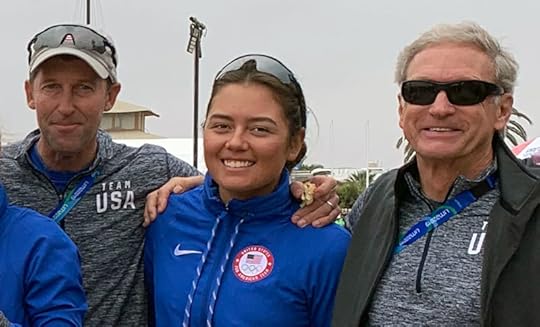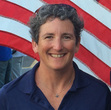U.S. Olympic Sailing: All Change
Last week, two departures rocked the world of US Olympic sailing: Greg Fisher (COO) and Malcolm Page (Olympic Chief). US Sailing is currently working to reorganize and refocus the existing staff (all very qualified as well), but that won’t solve the basic structural problems this program has been working around for more than decade.
 Malcolm Page, Charlotte Rose, and Greg Fisher at the 2019 Pan Am Games, where Team USA won seven medals.
Malcolm Page, Charlotte Rose, and Greg Fisher at the 2019 Pan Am Games, where Team USA won seven medals.I haven’t served on the Olympic Sailing Committee since 2016, but throughout this quad I’ve watched (and interviewed) both Greg and Malcolm, impressed by their vision of a cultural shift that would rebuild the U.S. Sailing Team back to medal-winning consistency. As far as I’m concerned, we were finally working in the right direction—though seriously hampered by a lack of solid and consistent funding, as well as those ongoing organizational challenges. Now two great leaders are gone, and there’s no clear indication of how we will dig ourselves out of this Olympic-swimming-pool-sized medal-less hole.
History repeats
As I think about how we might turn this latest upheaval into an opportunity, I keep returning to the same radical conclusion: we need to rebuild the Olympic program from the ground up. And that sends me right back to the fall of 2004, when a group of us (frustrated by USSailing’s support at the Athens Games) called for a similar reboot. The partial reorganization that followed was, in hindsight, too little, too late; fifteen years later, we’re still trying to catch up with the fully professional model successfully developed by other countries during that same time period.
We can blame a lack of government funding, but it’s also because US athletes have traditionally thrived on independence. My generation grew up without centralized coaching, went sailing because we liked it (with family and friends), and transferred that approach to our campaigns: hiring our own coaches, (mostly) raising our own funds, and taking the crumbs and clothing tossed to us by US Sailing—but never relying on the program for critical support.
That is no longer a medal-winning approach. Professional sport (and the Olympics are indeed professional) requires a centralized structure to guide athletes and shorten their learning curve—while also providing enough support to make multi-quad campaigns economically feasible. As Malcolm put it two years ago, “it’s about removing obstacles, about providing resources and knowledge and guidance to the athlete. And doing it in that [national] structure is where you’ll get the efficiencies. Both cost and performance.” (Read more of his thoughts in The Trump Card, which originally published in the October 2017 issue of Seahorse Magazine.)
While the Olympic Development Program is providing structure for younger athletes (who are posting some great results), the most recent leadership upheaval is teaching the same lesson to yet another generation of Olympic hopefuls: trusting USSailing leads to disappointment. That will make both medal-winning and fundraising harder, for years to come.
So as my mind swirls around where we are, how we got here, and how to learn from our past mistakes, I keep coming back to a basic realization; deep-seated problems cannot be fixed by slapping bandaids on the existing structure. Malcolm believes that “all the pieces of the puzzle are here” in the U.S., and I agree. Disruption is never something we seek out, but here we are… so let’s get out the TNT and blow up the whole thing right now, while we have the chance. All we need is a great leader—and there are at least two out there, looking for a fresh challenge.



